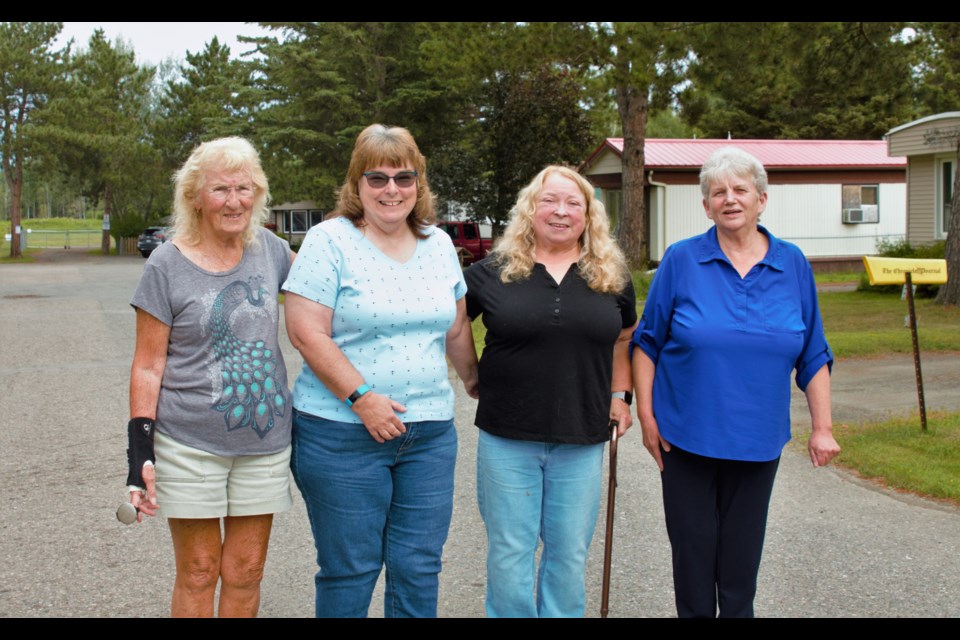THUNDER BAY — A move to consider selling off a city-owned mobile home park has generated concerted opposition from residents, who say the idea flies in the face of municipal commitments to expand affordable housing options.
Residents at Hillcourt Estates have submitted a petition against selling the park bearing over 400 signatures ahead of a city council discussion over the issue on Monday.
A group of residents who spoke with TBnewswatch say they struggle to understand why the city would sell an asset that generates a profit and provides high-quality affordable housing.
The 89-unit trailer park, located off of Rosslyn Road in the Neebing area, opened in 1976 and was taken over by the city in 1994 after a tax default.
Coun. Trevor Giertuga requested a report on the possible sale of the property in April, saying the city's ownership carries risks and competes with the private sector.
While the park generates around $170,000 a year in profit for the city, Giertuga has argued the benefits of selling it could be greater.
The at-large councillor says the city could potentially realize similar revenues in the form of interest if it invests the proceeds from selling the property, which he has speculated could go for several million dollars.
“I’m not an expert by any means, but I consulted with some people in the industry, and a figure has been put out to me somewhere around the $2 million to $3 million mark,” he said in an interview.
Giertuga also noted the city has around $750,000 in a reserve fund to support maintenance at Hillcourt Estates, which could be spent on other municipal infrastructure needs if the park were sold. The reserve was built up using revenue from the park.
It’s not the first time Hillcourt Estates residents have organized against a potential sale.
Council considered selling the property in 2004 and again in 2012, but ultimately voted to continue operating it each time.
Marian Leat, who has lived in the park since 1976, said residents are perplexed to see the issue returning to city council’s agenda.
“This is the third time they’ve tried to sell. We don’t understand why, because it’s affordable housing, and the city is supposed to be finding affordable housing,” she said.
“Here they own the land, they didn’t even have to buy the units — we own the units. No money ever comes out of the city coffers… Especially when it’s making money, why do they want to get rid of it?”
Resident Mandy Bruyere sees the arrangement as a win-win for the city and for residents.
"There is no city money that goes into maintaining this park, and there's not even city staff that come here and maintain it," she said. "So that profit they make helps ease the other tax payers' burden."
“The other thing this park does is it keeps people out of social housing and supportive housing, because we help our neighbours when they need help, so they’re able to stay in their homes… We know there’s not enough supportive housing now — the waitlist for that is about two years, and the demand is only going to increase.”
Residents have expressed concern that a private owner could impose higher fees, reduce maintenance, or look to rezone the land and close the park.
The park suffered from a number of septic and drainage problems when it was taken over. The city has since recovered what it spent addressing those issues, staff report.
Wendy Cooke, who moved to Hillcourt Estates in 2012, described it as a “great place to live” where people look out for each other.
“I moved in here because it was an affordable and safe neighbourhood,” she said. “I’m a senior on a senior’s pension, so limited income, and I can survive here. The apartments in Thunder Bay are very, very expensive and not affordable.”
Cooke said residents fear a possible closure of the park as a worst-case scenario, were it sold to a private company.
“I’ve talked to a majority of the owners here in Hillcourt, who are seniors and young families, who are very stressed out from the fact that the city has brought this up for possible sale again,” she said. “You know, we’re scared, because we might lose our affordable, safe homes that we love.”
Giertuga believes those concerns are overblown.
“If we sell, it’s regulated by the Landlord Tenant Act, so that [rent] could only go up [by] the percentage the ministry allows us to put it up every year. That wouldn’t change if it was sold,” he said.
“Noone would lose their homes — if someone were to buy it, they would buy it as a mobile home park.”
In a memo that will be considered by council Monday, staff advise “there are no cost savings associated with the divestment of the park” because it generates revenue for the city, and recommend against pursuing the sale.
The only city expenses associated with the park are domestic water distribution, fire hydrants, and garbage and recycling collection, staff indicated.
The memo does not address the sale value of the property, though staff were expected to present more information to council in a closed-door session before Monday’s public meeting.
Giertuga called his push to sell Hillcourt Estates part of a larger need to contain city spending, pointing to a projection the city could hike taxes by 6.6 per cent in 2024.
“We really need to dig in and roll up our sleeves, because we’re looking at a projected almost seven per cent increase next year. That’s not palatable to any constituent that I’ve heard [from],” he said.
“I think this is the first step of where this council needs to take things. We need to look at finding some extra dollars and to get out of some of the businesses we don’t need to be in, so we don’t need to keep increasing tax rates every year.”



